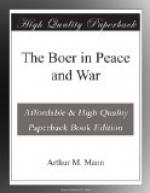Oom Paul is a very good man, but he kicks at the traces a great deal. He likes to go out of his way to find out what other people are saying about him, and he displays, moreover, another undesirable characteristic—he is suspicious. It is in the family; it is in the whole people. He is continually working himself up into the condition of a man whose highly-strung nerves convince him that the whole world is against him. He always imagined that everybody was working out plans of campaign by which it would be possible to annex the Transvaal to the British Empire. Fortunately there were other matters and other countries to consider, and if Oom Paul would just study a map of the world for a few weeks and reflect, he would probably find his position less irksome. But Oom Paul has a great deal to think about—he must think for the whole nation. The ’unfortunate affair which occurred after 1895’ seems to trouble him a great deal. Despite the fact that the country was well paid for it, this incident seems fated to crop up at least every six months, and it will be handed down to generations untold, so that it may ever be kept green. It will be nurtured and well looked after, and the one regret will be that it does not bring in an annual income in proportion to the original amount.
[Illustration: President Kruger.]
The Boer’s politics are summed up in the single word ‘Defence.’ He is not aggressive, but he is strong on Defence. Possession with him is ten points of the law—it is everything. Let the independence of his country be threatened, and he is at once a man of action. He figuratively converts his ploughshare into a sword, although the uses of that weapon are unknown to him. At the time of the Jameson Raid it may safely be asserted that there did not exist a single Boer—young or old—who was not in possession of a serviceable firearm and the full complement of ammunition. The Kantoors—i.e., the Government offices—were daily besieged by eager men as eager to possess themselves of the instruments and munitions of war. Every man was ready; farmers were no longer farmers, but soldiers, prepared to face the worst in the defence of their only love—their country.
CHAPTER VI
The Boer is not what one would call a sentimental person; he is practical in all his ways. If he sees a thunderstorm approaching, he does not go into raptures over the magnificence of the lightning; he watches that thunderstorm calmly and philosophically. And if he had anything to do with the order of the elements, he would have that thunderstorm come his way, and he would detain it exactly three days over his particular farm, so that the rain should leave a lasting impression upon his mealies and forage. The Boer likes wet weather, probably because he gets so little of it.




